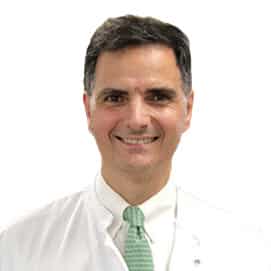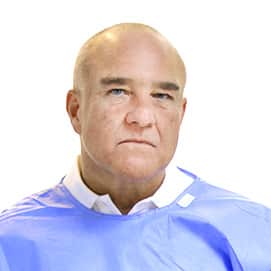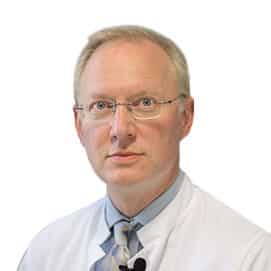If you suspect stomach cancer, the doctor prescribes the necessary examinations.
With their help, he finds out whether it is really a tumor and, if so, how far the pathological process is spread.
The necessary examination methods for detecting stomach cancer are:
- Clinical examination
- Endoscopic examination of the stomach (gastroscopy) Endoscopic examination of the stomach is the most important and informative examination for the detection of gastric cancer. If at some point the stomach lining is changed, you can use small forceps that are passed through the endoscope to take a tissue sample (biopsy). The resulting material is then examined under a microscope for the presence of cancer cells. Only then can it be accurately ascertained whether there is cancer or not. If gastric cancer is indeed detected, further examinations are carried out. This determines how far the tumor has spread, whether the lymph nodes are affected, and whether metastases have appeared in other organs. Common survey methods include:
- ultrasound diagnostics (ultrasound). With the help of ultrasound, the doctor can determine whether the tumor has already spread to other organs (the appearance of metastases). The organs of the abdominal cavity, primarily the liver, peritoneum, and lymph nodes, are examined for the presence of metastases.
- laboratory research. so-called tumor markers can be identified. We are talking about substances that intensively form tumor cells. Also, gastric carcinomas sometimes produce tumor markers, which can then be detected in the blood. They are called CEA (carcinoembryonic antigen), CA 72-4 and CA 19-9 (CA=cancer antigen). Tumor markers are still not present in all patients with gastric cancer and can also be found in healthy people. Therefore, for the diagnosis, they are rather of secondary importance. In the postoperative period, tumor markers are used to control the course of the disease. Regarding the choice of therapy for gastric cancer, the individual biology of the tumor is of increasing importance. Determining the HER2 status on the basis of tumor tissue taken during surgery or biopsy gives an idea of whether a given tumor can be treated with so-called antibody therapy.
- endosonography (endoscopic ultrasound). Endoscopic ultrasound, also called endosonography, gives a more accurate idea of how deep the tumor has penetrated into the stomach wall. This may be important for the planning of the operation.
- X-rays of light
- computed tomography (CT). Computed tomography is primarily used to clarify the spread of the tumor, as well as to search for metastases. We are talking about a special X-ray method, which layer by layer can enlighten the body. At the same time, the doctor gets an idea of how deep the tumor has penetrated into the tissues and how voluminous the operation will be. In addition, when using this technique, it is clearly visible whether the cancer has spread to neighboring organs or to regional lymph nodes (metastasis).
- endoscopic examination of the abdominal cavity (laparoscopy). For large tumors, an endoscopic examination of the abdomen (laparoscopy) may also be necessary. With its help, the doctor determines whether the peritoneum and liver are affected by cancer. The examination is carried out under the conditions of the so-called mini-laparoscopy after the injection of a sedative, i.e. without anesthesia.
- magnetic resonance imaging (MRI) liver. MRI is used primarily to clarify obscure structures in the liver that were found on ultrasound or CT. With the help of an MRI, the doctor wants to find out whether there are metastases in the liver or whether these are benign changes.
Only when all the necessary examinations are completed, the doctor together with the patient can decide which therapeutic measures are best indicated in this individual case. The treatment program for a patient today, especially with a localized tumor (without the presence of metastases), must be determined within the framework of an oncological conference, which means doctors of various specialties.
Professor, MD, PhD
Head of the Clinic of Oncology, Hematology and Palliative Medicine
Head of the Clinic of Oncology, Hematology and Palliative Medicine
Professor, MD, PhD
Head of the Clinic for General, Visceral, Thoracic and Endocrine Surgery
Head of the Clinic for General, Visceral, Thoracic and Endocrine Surgery
Professor, MD, PhD
Head of the Clinic for Radiation Therapy and Radiological Oncology
Head of the Clinic for Radiation Therapy and Radiological Oncology
Video
Precise mathematical calculations for the most effective radiation therapy.
Radiation therapy without harm to healthy tissue? In our clinic it is possible!
Guaranteeing optimal results in oncology - an interdisciplinary approach in radiotherapy.
A complete cure for cancer is possible thanks to the high precision of radiation therapy.
How does a radiation therapy and radiation oncology clinic work in Germany? (12+)
“Treating diabetes without insulin is possible!” - Professor Martin proves.
We reduce weight, pressure, sugar levels competently - a program awarded with an international scientific award
The right diet for diabetes is tasty, simple, effective and without the need for medications (12+).
The best diabetes doctor in Germany about the innovative program together with Deutsche Klinik Allianz.
Combined oncology treatment at the Bethesda Clinic is comprehensive and effective.
A unique center for thyroid surgery under the guidance of a leading specialist in Europe.
Why the clinic takes on complex medical cases and successfully handles them - says Dr. Zimon.
The best operating ophthalmologist in Germany about his experience of working with foreign patients.
Ophthalmologist Dr. Thomalla is an innovator who performed the world's first cornea transplant (6+).
About the treatment of reflux - the best surgeon in Germany Konstantinos Tsarras
Request appointment
Useful links
Photo gallery












